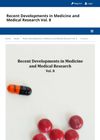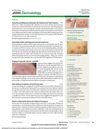 January 1987 in “Journal of steroid biochemistry/Journal of Steroid Biochemistry”
January 1987 in “Journal of steroid biochemistry/Journal of Steroid Biochemistry” Norethisterone (jenapharm) therapy is effective for endometrial cancer.
 January 2023 in “Rossiiskii Zhurnal Kozhnykh i Venericheskikh Boleznei”
January 2023 in “Rossiiskii Zhurnal Kozhnykh i Venericheskikh Boleznei” Androgenic alopecia in men is mainly linked to family history, hormonal imbalances, and metabolic issues, but can also be influenced by lifestyle habits, environmental factors, and deficiencies in certain vitamins and microelements like copper.
23 citations,
June 1997 in “Baillière's clinical obstetrics and gynaecology” Most women with too much androgens have PCOS, which can be managed with birth control pills, medication for hair growth, and fertility treatments, and losing weight helps too.
 82 citations,
May 2016 in “Best Practice & Research in Clinical Obstetrics & Gynaecology”
82 citations,
May 2016 in “Best Practice & Research in Clinical Obstetrics & Gynaecology” The conclusion is that managing androgen excess requires long-term treatment, including hormonal contraceptives and androgen blockers, with follow-up after six months.
 68 citations,
February 2019 in “Urology”
68 citations,
February 2019 in “Urology” Hormonal treatment in transgender women reduces semen quality, but stopping treatment may improve it.
 6 citations,
December 2022 in “International Journal of Molecular Sciences”
6 citations,
December 2022 in “International Journal of Molecular Sciences” Hormone imbalance is linked to Hidradenitis Suppurativa, a skin condition, and treatments like anti-androgenic therapy and metformin can help. It's also suggested to check patients for insulin resistance and Polycystic Ovary Syndrome.
4 citations,
August 2018 in “American journal of otolaryngology” Transgender women on estrogen therapy can develop melasma and need proper skin care.
 January 2024 in “Brazilian Journal of Hair Health”
January 2024 in “Brazilian Journal of Hair Health” Testosterone therapy in transgender men can lead to hair loss, with the risk increasing over time and influenced by family history.
 September 2023 in “International Journal of Community Medicine and Public Health”
September 2023 in “International Journal of Community Medicine and Public Health” Different sebaceous gland diseases can be treated with medications, hormone therapy, or surgical methods.
 February 1976 in “PubMed”
February 1976 in “PubMed” Sex hormone therapy is effective for certain skin conditions like acne and seborrhea, but less so for female hair loss and excessive hair growth.
 February 1960 in “Journal of the American Medical Association”
February 1960 in “Journal of the American Medical Association” Treatments for hair loss include estrogen therapy and special shampoos.
 4 citations,
June 2017 in “Endocrine Reviews”
4 citations,
June 2017 in “Endocrine Reviews” Dihydrotestosterone (DHT) mainly affects nearby cells, doesn't significantly change prostate hormonal environment or cancer risk, and doesn't play a main role in causing hair loss or acne. More research is needed on its effects on heart health, sexual function, and bone health.
 1 citations,
September 2020 in “Endocrinology, Diabetes & Metabolism Case Reports”
1 citations,
September 2020 in “Endocrinology, Diabetes & Metabolism Case Reports” The conclusion is that thorough investigation of hypertension and hormonal dysfunctions is important, and there may be a link between these conditions and cancer.
 4 citations,
May 2021 in “Dermatologic Clinics”
4 citations,
May 2021 in “Dermatologic Clinics” The conclusion is that hair loss in women is caused by a mix of hormonal, environmental, and genetic factors, and treatments should target these various causes.
 1 citations,
October 2017 in “Elsevier eBooks”
1 citations,
October 2017 in “Elsevier eBooks” Antiandrogens can treat female hormonal conditions, but environmental ones may harm reproductive health.
 September 2024 in “Ain Shams Medical Journal”
September 2024 in “Ain Shams Medical Journal” Androgenic alopecia causes hair thinning, and treatments include minoxidil, finasteride, and light therapy.
 18 citations,
January 2004 in “Dermatologic Clinics”
18 citations,
January 2004 in “Dermatologic Clinics” Skin problems in older people can indicate hormonal diseases, nutritional deficiencies, or conditions like diabetes, menopause, and HIV.
 16 citations,
September 2008 in “Dermatologic Therapy”
16 citations,
September 2008 in “Dermatologic Therapy” CAH is a genetic disorder affecting cortisol production and causing hormonal imbalances, with treatment and diagnosis varying by form and symptoms.
 September 2023 in “Gynäkologische Endokrinologie”
September 2023 in “Gynäkologische Endokrinologie” Menopause causes skin and hair to become drier and thinner, but hormone therapy can improve these conditions.
 11 citations,
May 2021 in “Journal of Medical Virology”
11 citations,
May 2021 in “Journal of Medical Virology” Men are more likely to have severe respiratory viral infections like COVID-19 due to hormonal and genetic differences, while women generally have stronger immune responses.
 4 citations,
January 2011 in “Dermatology”
4 citations,
January 2011 in “Dermatology” A patient grew extra hair on their ears after treatment for testicular cancer, possibly due to hormonal changes or genetics.
 105 citations,
January 2009 in “Medicine”
105 citations,
January 2009 in “Medicine” Hirsutism is more linked to high androgen levels than acne or hair loss, and a mix of hormonal tests is best for diagnosis; certain treatments can reduce symptoms.
 1 citations,
July 2021 in “Journal of Skin and Sexually Transmitted Diseases”
1 citations,
July 2021 in “Journal of Skin and Sexually Transmitted Diseases” Lipedema is a painful fat disorder in women that's hard to treat, often worsens with hormonal changes, and requires symptom-focused therapies.
 October 2021 in “Book Publisher International (a part of SCIENCEDOMAIN International)”
October 2021 in “Book Publisher International (a part of SCIENCEDOMAIN International)” Antioxidants and growth factors may help treat hair loss when combined with LED and Laser therapy.
 September 2016 in “JAMA Dermatology”
September 2016 in “JAMA Dermatology” Melanoma patients can learn to check their skin, early balding in men may indicate similar risks as PCOS in women, certain criteria can help predict skin cancer behavior, small skin cancer may not need extra therapy after surgery, and sterile gloves don't reduce infection in minor surgeries.

Doctors recommend postoperative radiation for male breast cancer, advise against testosterone for vasomotor symptoms post-adrenalectomy, suggest non-hormonal treatments for atrophic vaginitis after mastectomy, note no specific treatment for anticoagulant-induced hair loss, and call for more research on silicosis from silicon carbide exposure.
 9 citations,
August 2014 in “Journal of The American Academy of Dermatology”
9 citations,
August 2014 in “Journal of The American Academy of Dermatology” Hormonal imbalances may play a role in frontal fibrosing alopecia, and antiandrogenic drugs combined with steroids are currently the most effective treatment.
 1 citations,
January 2022
1 citations,
January 2022 Myo-inositol and D-chiro-inositol improve hormonal and physical symptoms in teenage girls with PCOS.
 October 2010 in “International Journal of Dermatology”
October 2010 in “International Journal of Dermatology” An 86-year-old man with prostate cancer was diagnosed with a rare, low-grade breast cancer and underwent surgery but declined additional hormone therapy.
 11 citations,
January 1991 in “Urology”
11 citations,
January 1991 in “Urology” New hormonal treatments for enlarged prostate show promise for safer, effective non-surgical options.




























